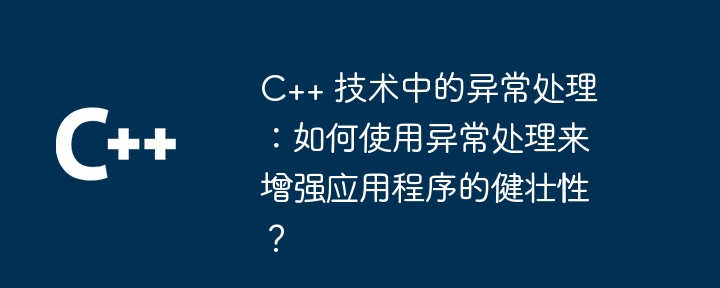
Exception handling is a powerful mechanism in C for handling unexpected events to prevent the program from crashing due to unexpected errors. The exception handling mechanism is based on the try-catch block. When an exception occurs, the control flow jumps to the catch block to handle the exception. Exceptions are usually represented by the std::exception class and its subclasses, which provide a what() method that returns an exception description. Exception handling can enhance application robustness, such as handling invalid user input, avoiding crashes and providing a friendly user experience.

Exception handling is a powerful mechanism in C for processing applications Unexpected events that may occur while the program is running. Exception handling allows you to detect and handle abnormal situations to prevent your program from crashing due to unexpected errors.
The exception handling mechanism in C is based on the try-catch block. A try block contains a section of code that may throw an exception. If an exception occurs, the program control flow will jump to the corresponding catch block to handle the exception.
try {
// 可能会引发异常的代码
} catch (const std::exception& e) {
// 异常处理代码
}Exceptions in C are usually represented as the std::exception class or its subclasses. The std::exception class provides the what() method that returns a descriptive message about the exception.
The following is a practical case that shows how to use exception handling to enhance the robustness of the application. Consider a program that gets an integer from user input. If no valid integer input is provided, the program should handle the exception gracefully and prompt the user to re-enter it.
int main() {
int number;
while (true) {
try {
std::cout << "Enter an integer: ";
std::cin >> number;
if (!std::cin) {
throw std::invalid_argument("Invalid integer input");
}
break; // 输入有效后退出循环
} catch (const std::invalid_argument& e) {
std::cerr << "Error: " << e.what() << endl;
}
}
return 0;
}In this example, the invalid_argument exception is used to handle situations where the user enters an invalid integer. After catching the exception, the program prints an error message to the user and continues to prompt the user for re-entry until a valid integer is provided.
Exception handling is a valuable feature that can significantly enhance the robustness and maintainability of a C application. By detecting and handling exceptions, applications can avoid crashes and provide a more user-friendly experience.
The above is the detailed content of Exception handling in C++ technology: How to use exception handling to enhance the robustness of applications?. For more information, please follow other related articles on the PHP Chinese website!
 What are the differences between c++ and c language
What are the differences between c++ and c language
 Recommended learning order for c++ and python
Recommended learning order for c++ and python
 Cost-effectiveness analysis of learning python and c++
Cost-effectiveness analysis of learning python and c++
 Is c language the same as c++?
Is c language the same as c++?
 Which is better to learn first, c language or c++?
Which is better to learn first, c language or c++?
 The difference and connection between c language and c++
The difference and connection between c language and c++
 C++ software Chinese change tutorial
C++ software Chinese change tutorial
 Cost-effectiveness analysis of learning python, java and c++
Cost-effectiveness analysis of learning python, java and c++




